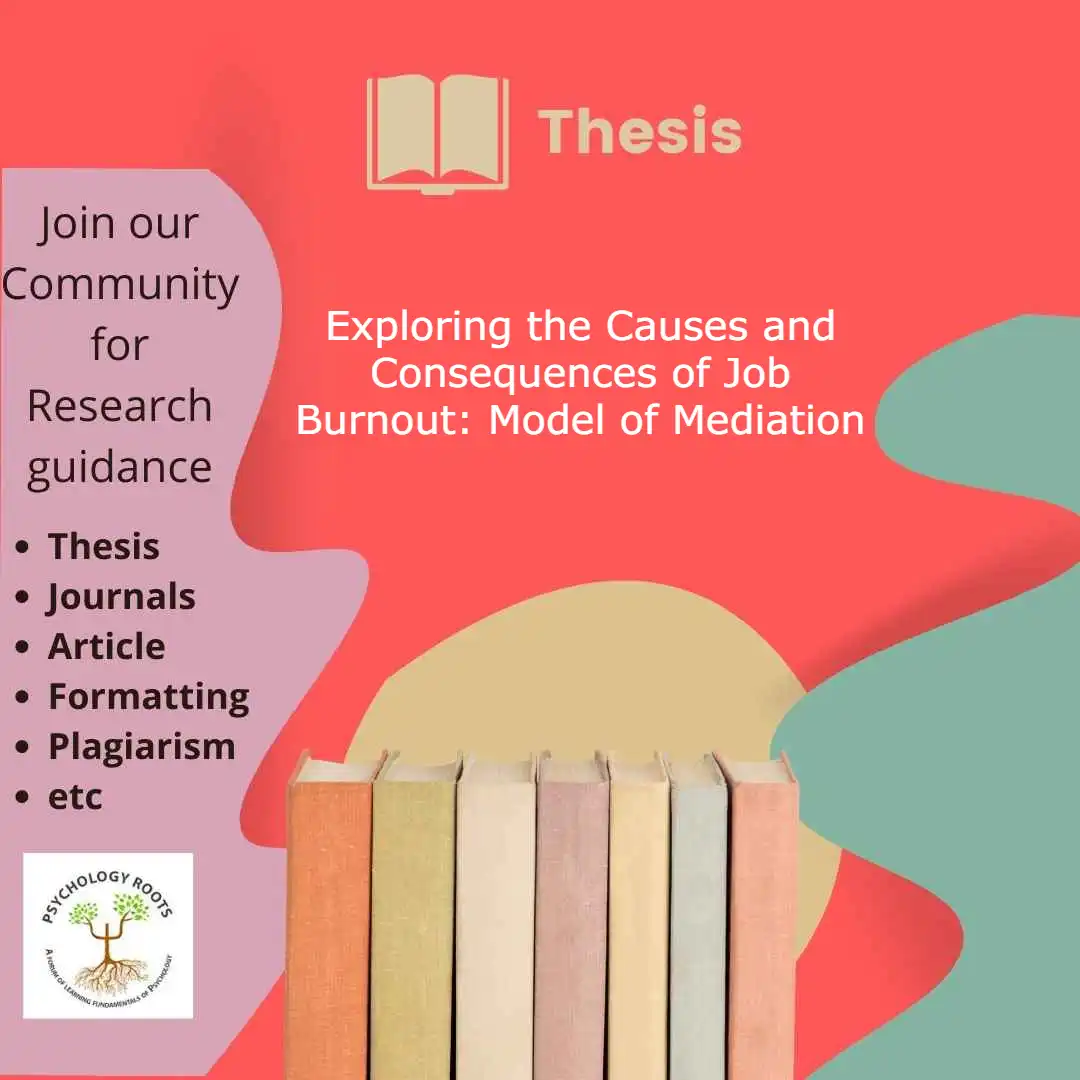Table of Contents
Exploring the Causes and Consequences of Job Burnout: Model of Mediation
Here in this post, we are sharing the full Psychology thesis on “Exploring the Causes and Consequences of Job Burnout: Model of Mediation“. You can read the abstract of the thesis with a download link. We have thousands of thesis in our collection (See articles). You can demand us any article related to psychology through our community, and we will provide you within a short time. Keep visiting Psychology Roots.
Abstract of the thesis
This study was conducted in an effort to bring forth awareness in the organizational setting of the emergence of burnout and its organizational causes and consequences. It investigated the relationship between employees’ perceived burnout and their workplace related factors that are known to promote burnout. Burnout was measured as a multi-dimensional variable that was emotional exhaustion, cynicism and lack of personal efficacy measured by Maslach Burnout Inventory-General Survey (MBI-GS). The causes of burnout focused in this study were demographic factors and work-related organizational factors. The work-related causes of burnout were divided into six factors (workload, control, reward, community, fairness and values) and were measured by Areas of Worklife Scale (AWS).
Organizational consequences focused in this study were job satisfaction, organizational commitment and turnover intention. The last part of this research tested the mediating nature of burnout between the AWS factors and the three organizational consequences. The sample size for this study was three hundred from which two hundred and sixty-three questionnaires was found usable. The sample was randomly selected form business organizations in the Lahore region. Statistical analyses used in this study were Pearson’s correlation, independent t-tests, ANOVA and multiple regression analysis. Data analysis revealed moderate level of burnout (once a month or less). The major findings of the study were: a) Age was found significantly and negatively related with exhaustion and cynicism.
Education was found significant and negatively related to lack of personal efficacy while unmarried employees and more experienced employees were found to report significantly higher level of exhaustion and cynicism. Public sector employees and service sector employees reported relatively more lack of personal efficacy; b) Workload, reward, fairness and values were found negatively related to emotional exhaustion and cynicism. Reward and values were negatively related to lack of personal efficacy; c) Exhaustion was found significant predictor of job satisfaction, organizational commitment and turnover intention. Cynicism was found to be negatively related with commitment and positively related to turnover intention. Lack of personal efficacy was negatively related to job satisfaction and organizational commitment; d) Burnout was found to be a partial mediator between AWS and job satisfaction, organizational commitment and turnover intention.
Researcher of the Thesis
- Shamila Nabi Khan
Avail Thesis [sociallocker id=64051]
[/sociallocker]
Need help in Research:
Are you struggling in research? Don’t Worry, We provide you with complete guidance and support free and quickly. Just need to create a query in our community. We also offer paid services such as:
- Thesis writing
- Article writing
- Statistical analysis
- Reference according to APA
- APA Formatting
- Supervisions
- Courses and Training
Contact us for the best quality free and paid services. info@psychologyroots.com or (+92-3336800644)
Information:
The purpose of our website is only to help students to assist them in finding the best suitable instrument for their research especially in Pakistan where students waste a lot of time in search of the instruments. It is totally free of cost and only for creating awareness and assisting students and researchers for good research. Moreover, it is necessary for you to take the permission of scales from their representative authors before use because copyrights are reserved by the respected authors.
Help Us Improve This Article
Did you find an inaccuracy? We work hard to provide accurate and scientifically reliable information. If you have found an error of any kind, please let us know.
Add comment. we appropriate your effort.
If you have any scale or any material related to psychology kindly share it with us at psychologyroots@gmail.com. We help others on behalf of you.
Follow
